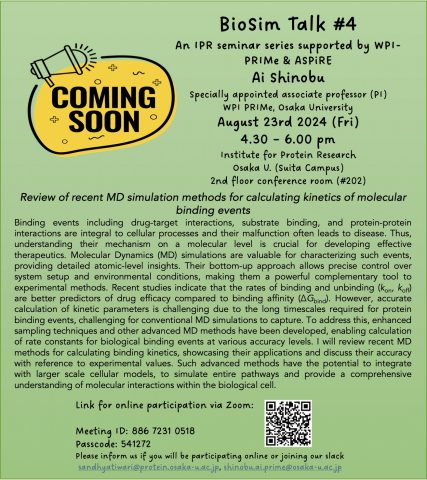NEWS
![]()
NEWSニュース
-

- NEWS
- 【8/23(金)】蛋白研セミナー:BioSim Talk #4 開催のご案内
セミナー
2024.08.19
【8/23(金)】蛋白研セミナー:BioSim Talk #4 開催のご案内
BioSim Talk #4 開催のご案内
(An IPR seminar series supported by WPI PRIMe and ASPiRE)
日時:2024年8月23日(金)16:30 – 18:00
場所:大阪大学(吹田キャンパス)蛋白質研究所 2階中会議室 + Zoom
(Zoomでの参加をご希望の方は下記までご連絡ください。)
[Meeting ID: 886 7231 0518 / Passcode: 541272]
[Contact]
Sandhya P. Tiwari
Email: sandhyatiwari[at]protein.osaka-u.ac.jp([at]は@に置き換えてください。)
Ai Shinobu
Email: shinobu.ai.prime[at]osaka-u.ac.jp([at]は@に置き換えてください。)
Review of recent MD simulation methods for calculating kinetics of molecular binding events
Speaker: Ai Shinobu
Specially Appointed Associate Professor (PI)
WPI PRIMe, Osaka University
Binding events including drug-target interactions, substrate binding, and protein-protein interactions are integral to cellular processes and their malfunction often leads to disease. Thus, understanding their mechanism on a molecular level is crucial for developing effective therapeutics. Molecular Dynamics (MD) simulations are valuable for characterizing such events, providing detailed atomic-level insights. Their bottom-up approach allows precise control over system setup and environmental conditions, making them a powerful complementary tool to experimental methods. Recent studies indicate that the rates of binding and unbinding (kon, koff) are better predictors of drug efficacy compared to binding affinity (ΔGbind). However, accurate calculation of kinetic parameters is challenging due to the long timescales required for protein binding events, challenging for conventional MD simulations to capture. To address this, enhanced sampling techniques and other advanced MD methods have been developed, enabling calculation of rate constants for biological binding events at various accuracy levels. I will review recent MD methods for calculating binding kinetics, showcasing their applications and discuss their accuracy with reference to experimental values. Such advanced methods have the potential to integrate with larger scale cellular models, to simulate entire pathways and provide a comprehensive understanding of molecular interactions within the biological cell.



